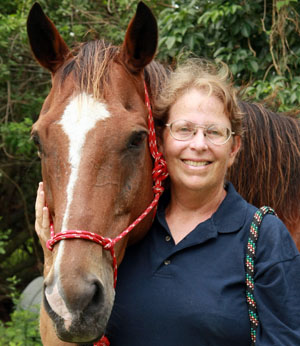A couple of years ago, I added a new gelding to my herd. He was a nice horse, a pleasure to ride and easy to work around. He was a handful at feeding time, kicking the stall and lunging with his teeth, but we worked at that, and he mellowed. A little.
Then he started getting aggressive to the other herd members; another gelding in particular. He became a bully, and would lie in wait for the poor gelding, who took to hiding in the back of the pasture.
Mr. Trouble, as we started calling the bully, had issues, and we worked on them, but his violent behavior escalated. One day, he cornered the poor, terrified gelding, who ended up jumping the pasture fence into the yard to escape.
That’s when the colics began. The persecuted gelding collicked so badly that he got cast up against the fence and had to spend a night at the veterinarian’s office on IV fluids. Just as upsetting, practically every other member of the herd started collicking on a fairly regular basis. Some of these horses had been with me for 10 years without a lick of trouble. I couldn’t figure it out. I walked the pasture, looking for some new poisonous plant. I asked my neighbors if they were feeding them a problematic treat. I read books, questioned vets, racked my brain trying to understand what was going on.
Obvious, right? It wasn’t to me, until Mr. Trouble finally found a new home, the herd heaved a collective sigh of relief, and all of the colic stopped. That’s when the penny finally dropped, and I got it.
Stress really does a number on anyone, and Mr. Trouble had so upset the herd’s balance that some horses couldn’t handle it. They were literally stressed into life-threatening illnesses. Interestingly, the horses who were above Mr. Trouble in the herd hierarchy weren’t affected, only the ones below him.
“Stress definitely can play havoc with a horse,” veterinarian Dr. Eileen Gesoff said. “It can affect them in a variety of ways, including ulcers and colic. Those are huge. You see that a lot, especially in race horses. I’d say 80 percent of race horses have ulcers, because they’re fed a lot of grain and live under high-stress conditions.”
Stress can impair a horse’s immune system and leave him more susceptible to viral and bacterial diseases, infections, colds and parasitic infestations, she explained.
“Shipping fever can result from stress. They can become depressed and quit eating,” Gesoff said. “Or they can become hyperactive and freak out, going over or through a fence, which can mean yet more injuries, gashes and cuts. If a horse is already predisposed to hoof problems, stress can push him over the edge into laminitis.”
In other words, stress can severely harm a horse, the same way it can impair people. Stress can be deadly if it’s not alleviated and managed in some fashion. Horses are herd animals, and they need to find safety and security within their herd. When that’s lacking, problems can arise. I’m pleased to say that since Mr. Trouble departed, no one had any problems. I got really good at recognizing the first stages of colic and dealing with it before it got too serious. I discovered a great recipe. When given in the very early stages, it wards off colic.
As soon as I noticed a horse standing with the hangdog look of something’s hurting, repeatedly getting down and rolling, refusing to graze or eat grain or hay, I immediately mixed up a batch of something called Dr. Z’s Magic Mild Colic Elixir, which I found in a terrific resource book titled The Original Book of Horse Treats, written and compiled by June V. Evers and published by Horse Hollow Press.
The caveat in the book states that the remedy has been used successfully for years by Dr. Z but isn’t offered as a substitute for experienced veterinary care. It recommends calling the vet at the first sign of colic, and consulting with the vet before administering any homemade colic remedies.
Well, I had lots and lots of vet bills and was swiftly going broke dealing with colic after colic, so I ran the recipe by Dr. Gesoff, and she said it sounded fine. And, in fact, it worked, which was a relief to me, my horses and my dwindling bank account.
The ingredients are: 4 cups of mineral oil, 1 cup of cheap wine and a dash of either ground cayenne pepper or ginger. Mix the ingredients thoroughly and administer orally to your horse with several large doses from a large basting syringe. Walk the horse for half an hour or so to prevent him from lying down and rolling. If the horse fails to show improvement, call the vet immediately.
This recipe was contributed to the book by Linda Lewin, who got it many years ago from a vet in Georgia. She notes that it’s important to keep the ingredients on hand, since it’s particularly embarrassing to rush to the store at 9 a.m. in a panic to buy cheap wine. Cashiers tend to give you a funny look, especially when you try to convince them that it’s for your horse, not for you!
I don’t drink wine, but I now have a large bottle of cheap red wine in my fridge, ready for the next time. This is one of those folklore remedies that can help get you through a rough patch.








